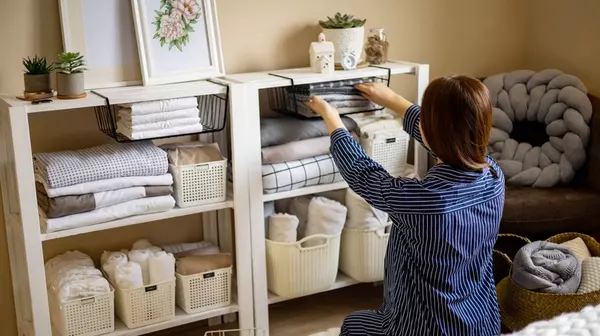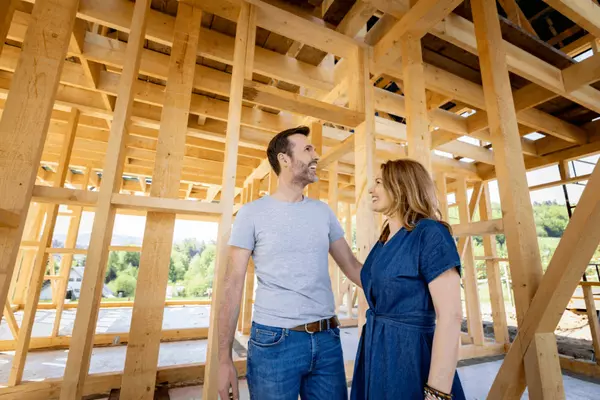All Categories and Topics

Keep Your Home in Top Shape: Essential Post-Sale Home Maintenance Tips

Buying vs. Building a House: 5 Essential Tips to Help You Make the Right Choice

Homeownership: The Key to Achieving the American Dream

Get Ready to Sell—How to Prepare for a Home Inspection as a Seller

7 Proven Open House Hacks: How to Wow Buyers on Day One

Understanding Closing Costs—What Every Homebuyer Needs to Know
Get Ready to Sell—How to Prepare for a Home Inspection as a Seller
Selling your home can be an exciting process, but one important step that often makes sellers nervous is the home inspection. Once you’ve accepted an offer, the buyer will likely schedule a home inspection to assess the condition of your property. While this can feel intimidating, the good news is that with a little preparation, you can make the inspection process smooth and stress-free. Here’s a guide to help you prepare for a home inspection as a seller and put your best foot forward.
1. Understand the Purpose of the Inspection
A home inspection is a standard part of the home-selling process. The buyer hires a professional inspector to evaluate your home’s structure and systems, looking for potential problems. The inspection is not about nitpicking every little detail but rather identifying significant issues that might need repair. Understanding this can help ease your nerves and allow you to focus on making necessary preparations.
A home inspection evaluates the condition of your property.
It focuses on major systems and structural issues, not minor cosmetic problems.
Understanding the purpose helps reduce anxiety and keeps your focus clear.
2. Make Necessary Repairs Before the Inspection
One of the best ways to prepare for a home inspection is to take care of any obvious repairs in advance. Walk through your home and fix things like leaky faucets, broken light fixtures, or doors that don’t close properly. Small issues can add up, so handling these ahead of time will show the buyer that you’ve maintained the home and may prevent minor problems from becoming bargaining chips during negotiations.
Address small repairs like leaky faucets, broken fixtures, or stuck doors.
Taking care of minor issues shows that the home has been well-maintained.
Prevent small problems from becoming negotiation points during the sale.
3. Clean and Declutter Your Home
A clean, well-organized home makes a positive impression on the inspector and the buyer. Before the inspection, thoroughly clean your home, declutter spaces, and make sure every room is easily accessible. Clear out closets, attics, and basements so the inspector can examine all areas of the home without obstruction. While cleanliness won’t affect the outcome of the inspection, it can make the process smoother and help you present your home in its best light.
Clean and declutter your home to create a positive impression.
Ensure all areas of the home are easily accessible for the inspector.
A clean space reflects a well-cared-for home, even though it doesn’t directly impact the inspection.
4. Provide Access to Key Areas
Home inspectors need to examine all major systems, so it’s essential to ensure they have access to key areas like the attic, basement, electrical panels, and HVAC units. Move furniture or stored items out of the way, and unlock any doors or gates to make it easy for the inspector to do their job. This simple step can help the inspection go faster and smoother.
Ensure access to important areas like the attic, basement, and HVAC system.
Move furniture and storage items away from critical systems.
Unlock doors or gates to provide easy access for the inspector.
5. Prepare Documentation
If you’ve made repairs, upgrades, or regular maintenance on your home, gather the documentation to present to the inspector and buyer. Having receipts, warranties, or records of service can demonstrate that you’ve taken care of your home, especially for larger repairs like roof replacements or HVAC servicing. This can reassure the buyer that the property has been well-maintained and reduce any concerns they may have.
Gather documentation for any repairs, upgrades, or regular maintenance.
Provide receipts, warranties, or service records for larger repairs.
Documentation offers proof of responsible homeownership and helps ease buyer concerns.
6. Be Ready to Leave During the Inspection
While it’s tempting to stay and answer questions, it’s best to leave the home during the inspection. This gives the buyer and inspector the space to examine the property without feeling pressured. Leave the home tidy, set the thermostat to a comfortable temperature, and give them privacy to complete the inspection.
Plan to leave your home during the inspection to give the buyer privacy.
Make sure the home is comfortable by adjusting the thermostat as needed.
Leaving during the inspection allows the process to run smoothly without distractions.
In Summary
Preparing for a home inspection doesn’t have to be overwhelming. By understanding the purpose of the inspection, addressing minor repairs, cleaning and decluttering, and ensuring access to critical areas, you can present your home in the best possible light. The goal is to make the process as smooth as possible for the inspector and buyer while showcasing that your home has been well-maintained and cared for.
Ready to Sell? Let’s Make the Process Smooth and Stress-Free!
If you’re thinking about selling and want to prepare for the home inspection, I’m here to help. Contact me today for expert advice on getting your home ready and making the selling process a breeze!
7 Proven Open House Hacks: How to Wow Buyers on Day One
First impressions matter—especially when it comes to selling your home. The open house is your chance to wow potential buyers and show off your property in its best light. A successful open house can generate buzz, attract offers, and set your home apart from the competition. But how do you make sure your home is the one buyers fall in love with? Here are some essential open house hacks to help you impress buyers from the moment they walk in.
1. Boost Curb Appeal
The outside of your home is the first thing buyers see, so make sure it’s inviting and well-maintained. Mow the lawn, trim the hedges, and add a fresh coat of paint to your front door if needed. Simple touches like adding potted plants or cleaning up the driveway can make a big difference in how your home is perceived before buyers even step inside.
Mow the lawn and tidy up the garden for a fresh look.
Paint the front door or add new house numbers for a welcoming entrance.
Clean the driveway and walkways to boost curb appeal.
2. Declutter and Depersonalize
When buyers walk through your home, they want to imagine themselves living there—not you. Declutter as much as possible by putting away personal items like family photos, knick-knacks, and excess furniture. The goal is to create a clean, neutral space that allows buyers to visualize their own lives unfolding in your home.
Remove personal items like family photos and knick-knacks.
Clear out excess furniture to make rooms feel larger and more open.
Create a neutral, clutter-free space that appeals to all buyers.
3. Deep Clean Every Room
A spotless home leaves a lasting impression. Before your open house, give your home a deep clean from top to bottom. This includes scrubbing floors, wiping down countertops, cleaning windows, and even washing baseboards. Don’t forget often-overlooked areas like the bathroom grout, light fixtures, and ceiling fans. A fresh-smelling, clean space signals to buyers that the home has been well cared for.
Scrub floors, wipe down surfaces, and clean windows for a polished look.
Pay attention to details like grout, baseboards, and light fixtures.
Use fresh scents and air out the house to create an inviting atmosphere.
4. Stage Each Room for Maximum Appeal
Staging is about creating a welcoming, functional layout that makes your home feel stylish and livable. Rearrange furniture to highlight the room’s best features and add cozy touches like throw pillows, rugs, or fresh flowers. Each room should have a clear purpose—whether it’s a reading nook, home office, or dining space—so buyers can envision how they’ll use the space.
Rearrange furniture to create an inviting and functional layout.
Use cozy accents like throw pillows, rugs, and flowers to warm up the space.
Stage each room with a clear purpose to help buyers imagine living there.
5. Let in Natural Light
Natural light can make any space feel bigger and more inviting. Before your open house, open curtains, blinds, and shades to let in as much natural light as possible. If you have rooms that don’t get much sunlight, consider adding extra lighting with lamps or brighter bulbs to create a warm and welcoming glow.
Open curtains and blinds to maximize natural light.
Add lamps or brighter bulbs in darker areas to enhance the space.
Natural light helps rooms feel more open and inviting to buyers.
6. Create a Welcoming Atmosphere
The atmosphere of your open house can greatly influence a buyer’s experience. Set the mood by playing soft, relaxing music in the background and keeping the temperature comfortable. Offer light refreshments like cookies, fruit, or cold drinks, which not only makes buyers feel welcome but encourages them to linger longer.
Play soft background music to create a relaxing ambiance.
Offer light refreshments like cookies, water, or fruit.
Set the temperature to a comfortable level to keep buyers at ease.
7. Highlight Unique Features
Make sure to showcase your home’s standout features during the open house. Whether it’s a gourmet kitchen, a spacious backyard, or a newly renovated bathroom, draw attention to these areas with thoughtful staging or signage. Point out upgrades or recent improvements to show buyers the value they’re getting.
Highlight unique features like a gourmet kitchen or large backyard.
Use staging or signage to draw attention to standout areas.
Mention any upgrades or renovations to showcase the home’s value.
In Summary
An open house is your chance to make a lasting first impression on potential buyers. By focusing on curb appeal, decluttering, deep cleaning, staging, and creating a welcoming atmosphere, you can ensure your home stands out from the competition. With these open house hacks, you’ll be well on your way to wowing buyers on day one!
Need Help Preparing for Your Open House?
If you're ready to sell and want expert advice on preparing your home for an open house, I’m here to help. Contact me today for tips and professional guidance to make your open house a success.
The Benefits of Working with a Realtor When Buying or Selling a Home
Whether you’re buying your first home or selling a property, one of the most important decisions you can make is whether to work with a realtor. With so much information available online, some people may wonder if hiring a real estate professional is necessary. The truth is, working with a realtor can make the entire process smoother, faster, and less stressful. Here’s why partnering with a realtor is one of the best decisions you can make when navigating the real estate market.
1. Expert Knowledge and Experience
Realtors bring valuable expertise to the table. From understanding market trends to knowing the ins and outs of contracts, they have the experience to guide you through the entire buying or selling process. They can answer your questions, handle the paperwork, and anticipate potential challenges, ensuring a smooth transaction.
Realtors have in-depth knowledge of market trends and real estate laws.
They can guide you through every step of the buying or selling process.
Experienced realtors can identify potential challenges and offer solutions.
2. Access to Exclusive Listings and Networks
One of the biggest advantages of working with a realtor is their access to exclusive property listings and professional networks. While you can browse homes online, realtors often have access to properties that aren’t yet publicly listed. Additionally, they can connect you with trusted lenders, home inspectors, contractors, and other professionals you may need throughout the transaction.
Realtors have access to off-market listings you might not find online.
They have strong networks of lenders, inspectors, and contractors.
Realtors can help you find properties before they hit the broader market.
3. Negotiation Skills to Get You the Best Deal
Real estate negotiations can be tricky, but a skilled realtor is trained to negotiate on your behalf to get you the best possible deal. Whether you're buying and want to secure a fair price or selling and aiming for top dollar, a realtor will use their negotiation skills to ensure your interests are protected.
Realtors are expert negotiators who can secure favorable deals.
They advocate for your best interests, whether you're buying or selling.
A realtor can help you navigate negotiations without the stress.
4. Pricing Expertise and Market Insights
If you’re selling your home, pricing it correctly is key to a quick and successful sale. Realtors use market data and local knowledge to determine the best listing price for your property. On the buying side, they can provide insights into whether a home is priced fairly, helping you avoid overpaying.
Realtors provide accurate pricing advice based on market data.
They help sellers price their home competitively to attract buyers.
Realtors ensure buyers aren’t overpaying for a property by analyzing market trends.
5. Handling the Paperwork and Legalities
Real estate transactions come with a lot of paperwork, contracts, and legal details. A realtor will handle the documentation, making sure everything is completed accurately and on time. This ensures that your transaction stays on track and that you meet all legal requirements, reducing the risk of mistakes that could delay or derail the process.
Realtors handle the paperwork, contracts, and legal requirements.
They ensure everything is completed accurately and on time.
Avoid potential legal pitfalls by having a professional manage the documentation.
6. Saving Time and Reducing Stress
Navigating the real estate market can be time-consuming and stressful, especially if you're handling it on your own. A realtor takes the burden off your shoulders by doing the legwork for you—whether that’s finding listings, scheduling showings, or marketing your home. Their expertise allows you to focus on what matters most while they handle the details.
Realtors save you time by managing the details of the transaction.
They handle the logistics, from showings to marketing, to streamline the process.
Working with a realtor reduces stress and keeps the transaction on track.
7. Local Market Knowledge
Every real estate market is different, and having a local expert on your side is invaluable. A realtor knows the ins and outs of your area, including which neighborhoods are appreciating, what homes are selling for, and what buyers are looking for. Their local expertise helps you make more informed decisions whether you’re buying or selling.
Realtors have local market knowledge that is crucial for informed decisions.
They know which neighborhoods are appreciating and what buyers are looking for.
Local expertise ensures you buy or sell at the right price and time.
In Summary
While it’s possible to buy or sell a home without a realtor, having a professional on your side makes the entire process easier, faster, and more successful. Realtors bring expertise, negotiation skills, market insights, and a network of resources that can help you get the best results. Whether you’re looking to buy your dream home or sell your property for top dollar, working with a realtor is a smart investment in your success.
Looking for a Realtor? Let’s Work Together
If you’re thinking about buying or selling a home and want professional guidance, I’m here to help! Contact me today to learn more about how I can assist you throughout the entire process.

Taylor Redmond
Phone:+1(540) 255-6930
Leave a Message
Client Success Stories
Let's get in touch!






